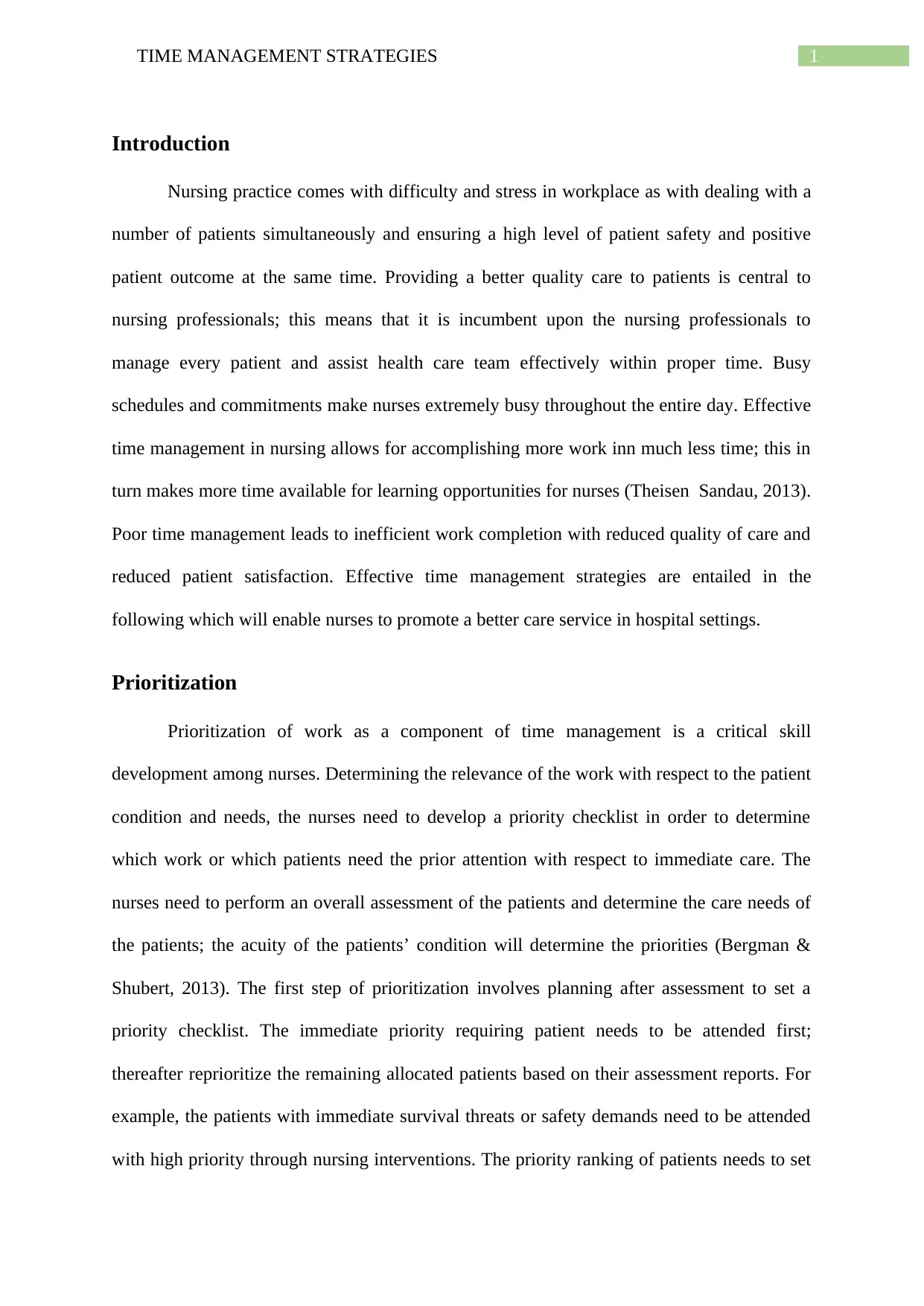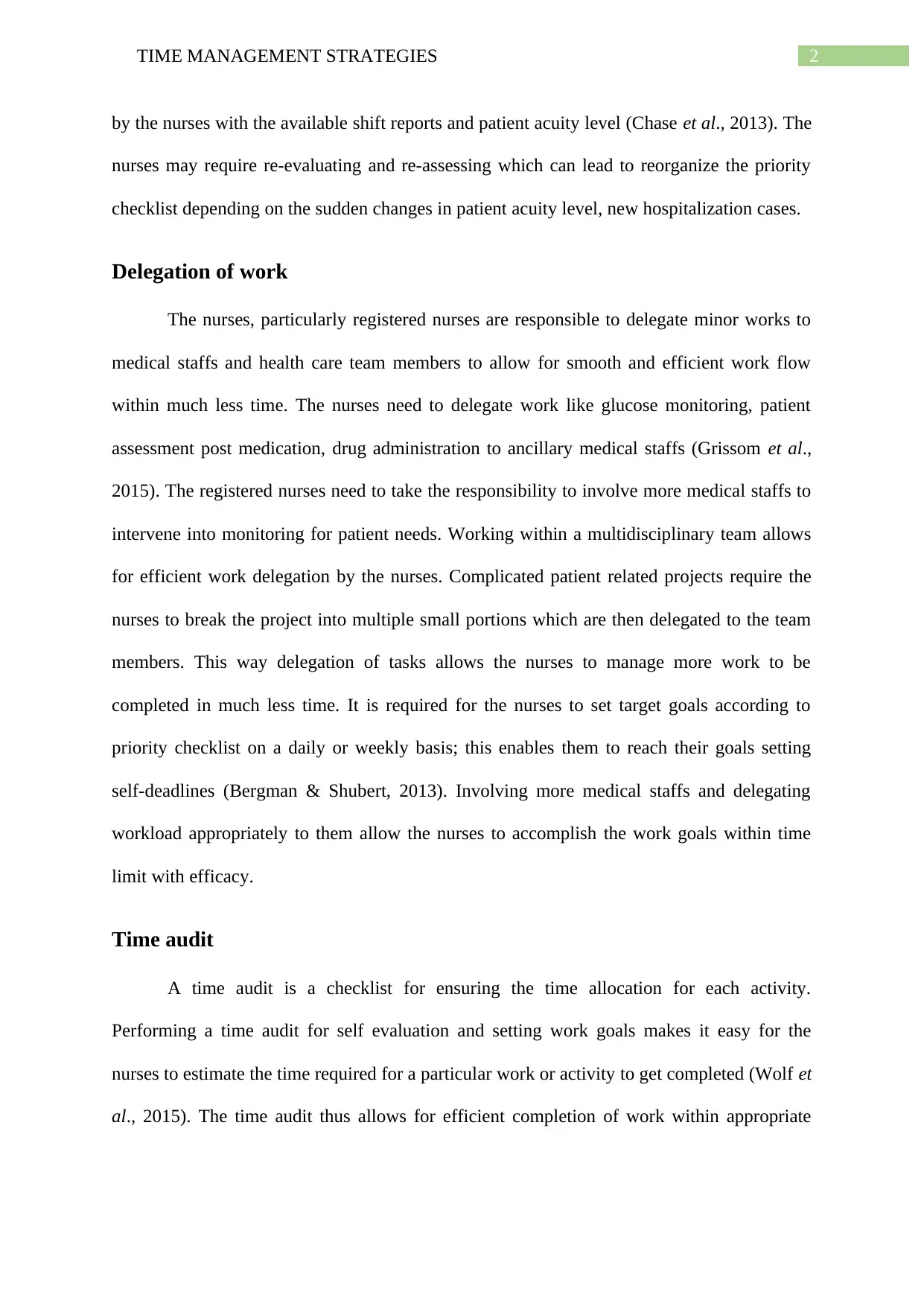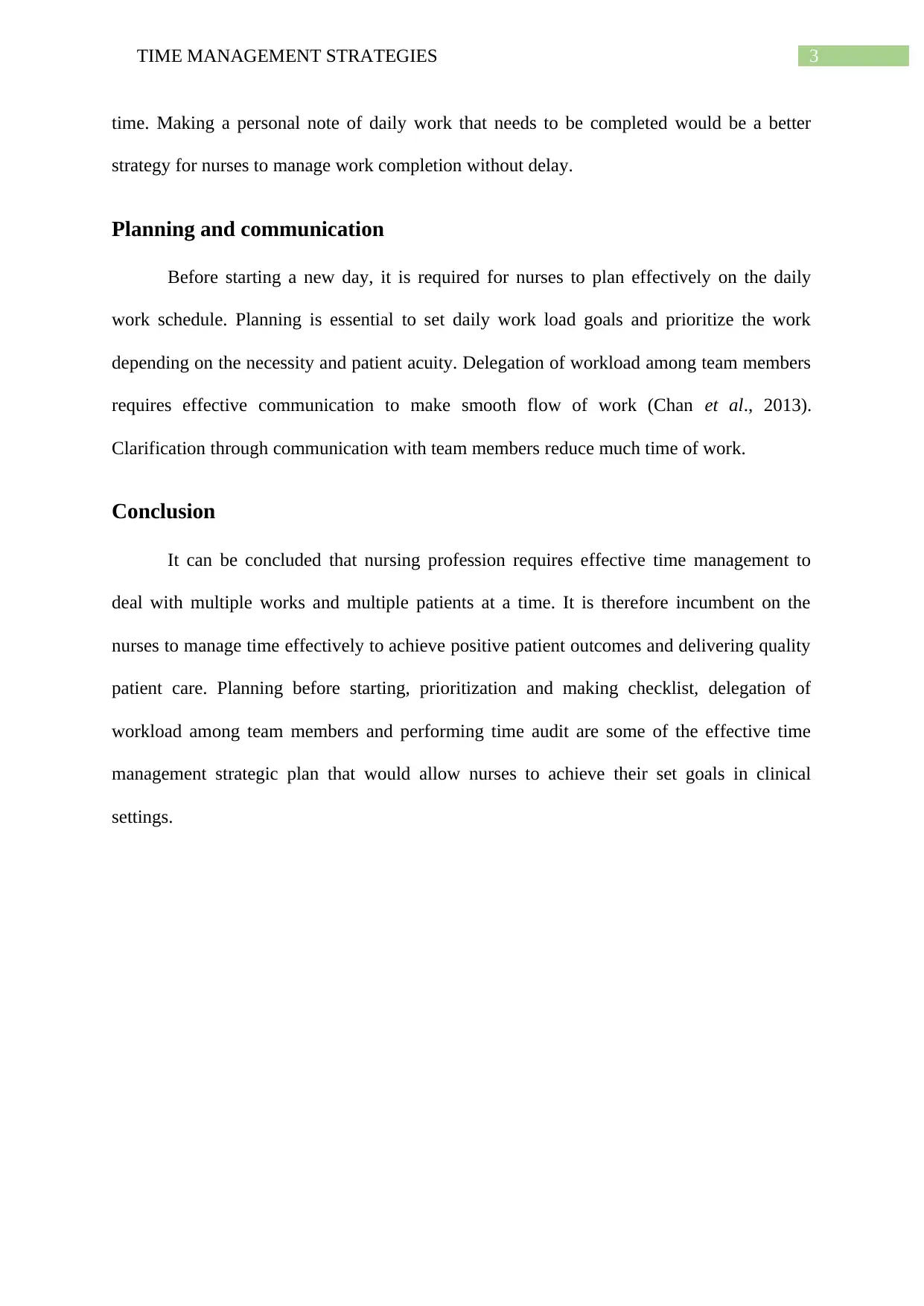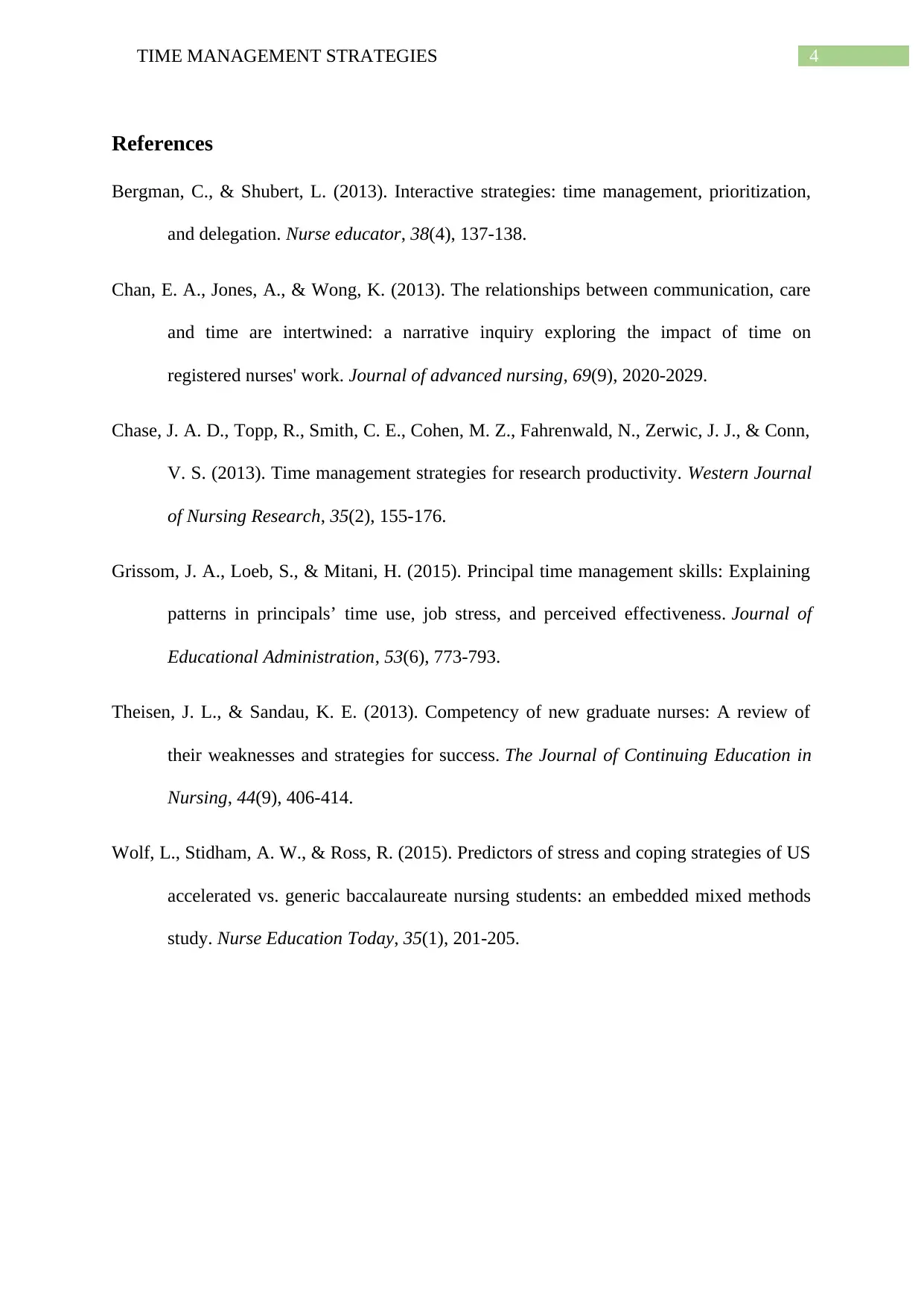Time Management Strategies for Nurses: A Comprehensive Report
VerifiedAdded on 2023/04/23
|6
|1177
|423
Report
AI Summary
This report delves into effective time management strategies crucial for nursing professionals to enhance patient care and improve workplace efficiency. It emphasizes the challenges nurses face due to busy schedules and the importance of time management in delivering quality care. The report outlines key strategies such as prioritization of tasks based on patient needs and acuity, delegation of responsibilities to healthcare team members, conducting time audits for self-evaluation, and effective planning and communication. Prioritization involves assessing patient conditions to determine immediate care needs, while delegation allows nurses to manage workload efficiently. Time audits help in allocating time for each activity, and effective planning and communication ensure smooth workflow. The conclusion highlights the necessity of these strategies for achieving positive patient outcomes and delivering quality patient care in clinical settings. The report also provides references to support the discussed strategies.

Running head: TIME MANAGEMENT STRATEGIES
Time Management Strategies
Name of student:
Name of university:
Author Note:
Time Management Strategies
Name of student:
Name of university:
Author Note:
Paraphrase This Document
Need a fresh take? Get an instant paraphrase of this document with our AI Paraphraser

1TIME MANAGEMENT STRATEGIES
Introduction
Nursing practice comes with difficulty and stress in workplace as with dealing with a
number of patients simultaneously and ensuring a high level of patient safety and positive
patient outcome at the same time. Providing a better quality care to patients is central to
nursing professionals; this means that it is incumbent upon the nursing professionals to
manage every patient and assist health care team effectively within proper time. Busy
schedules and commitments make nurses extremely busy throughout the entire day. Effective
time management in nursing allows for accomplishing more work inn much less time; this in
turn makes more time available for learning opportunities for nurses (Theisen Sandau, 2013).
Poor time management leads to inefficient work completion with reduced quality of care and
reduced patient satisfaction. Effective time management strategies are entailed in the
following which will enable nurses to promote a better care service in hospital settings.
Prioritization
Prioritization of work as a component of time management is a critical skill
development among nurses. Determining the relevance of the work with respect to the patient
condition and needs, the nurses need to develop a priority checklist in order to determine
which work or which patients need the prior attention with respect to immediate care. The
nurses need to perform an overall assessment of the patients and determine the care needs of
the patients; the acuity of the patients’ condition will determine the priorities (Bergman &
Shubert, 2013). The first step of prioritization involves planning after assessment to set a
priority checklist. The immediate priority requiring patient needs to be attended first;
thereafter reprioritize the remaining allocated patients based on their assessment reports. For
example, the patients with immediate survival threats or safety demands need to be attended
with high priority through nursing interventions. The priority ranking of patients needs to set
Introduction
Nursing practice comes with difficulty and stress in workplace as with dealing with a
number of patients simultaneously and ensuring a high level of patient safety and positive
patient outcome at the same time. Providing a better quality care to patients is central to
nursing professionals; this means that it is incumbent upon the nursing professionals to
manage every patient and assist health care team effectively within proper time. Busy
schedules and commitments make nurses extremely busy throughout the entire day. Effective
time management in nursing allows for accomplishing more work inn much less time; this in
turn makes more time available for learning opportunities for nurses (Theisen Sandau, 2013).
Poor time management leads to inefficient work completion with reduced quality of care and
reduced patient satisfaction. Effective time management strategies are entailed in the
following which will enable nurses to promote a better care service in hospital settings.
Prioritization
Prioritization of work as a component of time management is a critical skill
development among nurses. Determining the relevance of the work with respect to the patient
condition and needs, the nurses need to develop a priority checklist in order to determine
which work or which patients need the prior attention with respect to immediate care. The
nurses need to perform an overall assessment of the patients and determine the care needs of
the patients; the acuity of the patients’ condition will determine the priorities (Bergman &
Shubert, 2013). The first step of prioritization involves planning after assessment to set a
priority checklist. The immediate priority requiring patient needs to be attended first;
thereafter reprioritize the remaining allocated patients based on their assessment reports. For
example, the patients with immediate survival threats or safety demands need to be attended
with high priority through nursing interventions. The priority ranking of patients needs to set

2TIME MANAGEMENT STRATEGIES
by the nurses with the available shift reports and patient acuity level (Chase et al., 2013). The
nurses may require re-evaluating and re-assessing which can lead to reorganize the priority
checklist depending on the sudden changes in patient acuity level, new hospitalization cases.
Delegation of work
The nurses, particularly registered nurses are responsible to delegate minor works to
medical staffs and health care team members to allow for smooth and efficient work flow
within much less time. The nurses need to delegate work like glucose monitoring, patient
assessment post medication, drug administration to ancillary medical staffs (Grissom et al.,
2015). The registered nurses need to take the responsibility to involve more medical staffs to
intervene into monitoring for patient needs. Working within a multidisciplinary team allows
for efficient work delegation by the nurses. Complicated patient related projects require the
nurses to break the project into multiple small portions which are then delegated to the team
members. This way delegation of tasks allows the nurses to manage more work to be
completed in much less time. It is required for the nurses to set target goals according to
priority checklist on a daily or weekly basis; this enables them to reach their goals setting
self-deadlines (Bergman & Shubert, 2013). Involving more medical staffs and delegating
workload appropriately to them allow the nurses to accomplish the work goals within time
limit with efficacy.
Time audit
A time audit is a checklist for ensuring the time allocation for each activity.
Performing a time audit for self evaluation and setting work goals makes it easy for the
nurses to estimate the time required for a particular work or activity to get completed (Wolf et
al., 2015). The time audit thus allows for efficient completion of work within appropriate
by the nurses with the available shift reports and patient acuity level (Chase et al., 2013). The
nurses may require re-evaluating and re-assessing which can lead to reorganize the priority
checklist depending on the sudden changes in patient acuity level, new hospitalization cases.
Delegation of work
The nurses, particularly registered nurses are responsible to delegate minor works to
medical staffs and health care team members to allow for smooth and efficient work flow
within much less time. The nurses need to delegate work like glucose monitoring, patient
assessment post medication, drug administration to ancillary medical staffs (Grissom et al.,
2015). The registered nurses need to take the responsibility to involve more medical staffs to
intervene into monitoring for patient needs. Working within a multidisciplinary team allows
for efficient work delegation by the nurses. Complicated patient related projects require the
nurses to break the project into multiple small portions which are then delegated to the team
members. This way delegation of tasks allows the nurses to manage more work to be
completed in much less time. It is required for the nurses to set target goals according to
priority checklist on a daily or weekly basis; this enables them to reach their goals setting
self-deadlines (Bergman & Shubert, 2013). Involving more medical staffs and delegating
workload appropriately to them allow the nurses to accomplish the work goals within time
limit with efficacy.
Time audit
A time audit is a checklist for ensuring the time allocation for each activity.
Performing a time audit for self evaluation and setting work goals makes it easy for the
nurses to estimate the time required for a particular work or activity to get completed (Wolf et
al., 2015). The time audit thus allows for efficient completion of work within appropriate
⊘ This is a preview!⊘
Do you want full access?
Subscribe today to unlock all pages.

Trusted by 1+ million students worldwide

3TIME MANAGEMENT STRATEGIES
time. Making a personal note of daily work that needs to be completed would be a better
strategy for nurses to manage work completion without delay.
Planning and communication
Before starting a new day, it is required for nurses to plan effectively on the daily
work schedule. Planning is essential to set daily work load goals and prioritize the work
depending on the necessity and patient acuity. Delegation of workload among team members
requires effective communication to make smooth flow of work (Chan et al., 2013).
Clarification through communication with team members reduce much time of work.
Conclusion
It can be concluded that nursing profession requires effective time management to
deal with multiple works and multiple patients at a time. It is therefore incumbent on the
nurses to manage time effectively to achieve positive patient outcomes and delivering quality
patient care. Planning before starting, prioritization and making checklist, delegation of
workload among team members and performing time audit are some of the effective time
management strategic plan that would allow nurses to achieve their set goals in clinical
settings.
time. Making a personal note of daily work that needs to be completed would be a better
strategy for nurses to manage work completion without delay.
Planning and communication
Before starting a new day, it is required for nurses to plan effectively on the daily
work schedule. Planning is essential to set daily work load goals and prioritize the work
depending on the necessity and patient acuity. Delegation of workload among team members
requires effective communication to make smooth flow of work (Chan et al., 2013).
Clarification through communication with team members reduce much time of work.
Conclusion
It can be concluded that nursing profession requires effective time management to
deal with multiple works and multiple patients at a time. It is therefore incumbent on the
nurses to manage time effectively to achieve positive patient outcomes and delivering quality
patient care. Planning before starting, prioritization and making checklist, delegation of
workload among team members and performing time audit are some of the effective time
management strategic plan that would allow nurses to achieve their set goals in clinical
settings.
Paraphrase This Document
Need a fresh take? Get an instant paraphrase of this document with our AI Paraphraser

4TIME MANAGEMENT STRATEGIES
References
Bergman, C., & Shubert, L. (2013). Interactive strategies: time management, prioritization,
and delegation. Nurse educator, 38(4), 137-138.
Chan, E. A., Jones, A., & Wong, K. (2013). The relationships between communication, care
and time are intertwined: a narrative inquiry exploring the impact of time on
registered nurses' work. Journal of advanced nursing, 69(9), 2020-2029.
Chase, J. A. D., Topp, R., Smith, C. E., Cohen, M. Z., Fahrenwald, N., Zerwic, J. J., & Conn,
V. S. (2013). Time management strategies for research productivity. Western Journal
of Nursing Research, 35(2), 155-176.
Grissom, J. A., Loeb, S., & Mitani, H. (2015). Principal time management skills: Explaining
patterns in principals’ time use, job stress, and perceived effectiveness. Journal of
Educational Administration, 53(6), 773-793.
Theisen, J. L., & Sandau, K. E. (2013). Competency of new graduate nurses: A review of
their weaknesses and strategies for success. The Journal of Continuing Education in
Nursing, 44(9), 406-414.
Wolf, L., Stidham, A. W., & Ross, R. (2015). Predictors of stress and coping strategies of US
accelerated vs. generic baccalaureate nursing students: an embedded mixed methods
study. Nurse Education Today, 35(1), 201-205.
References
Bergman, C., & Shubert, L. (2013). Interactive strategies: time management, prioritization,
and delegation. Nurse educator, 38(4), 137-138.
Chan, E. A., Jones, A., & Wong, K. (2013). The relationships between communication, care
and time are intertwined: a narrative inquiry exploring the impact of time on
registered nurses' work. Journal of advanced nursing, 69(9), 2020-2029.
Chase, J. A. D., Topp, R., Smith, C. E., Cohen, M. Z., Fahrenwald, N., Zerwic, J. J., & Conn,
V. S. (2013). Time management strategies for research productivity. Western Journal
of Nursing Research, 35(2), 155-176.
Grissom, J. A., Loeb, S., & Mitani, H. (2015). Principal time management skills: Explaining
patterns in principals’ time use, job stress, and perceived effectiveness. Journal of
Educational Administration, 53(6), 773-793.
Theisen, J. L., & Sandau, K. E. (2013). Competency of new graduate nurses: A review of
their weaknesses and strategies for success. The Journal of Continuing Education in
Nursing, 44(9), 406-414.
Wolf, L., Stidham, A. W., & Ross, R. (2015). Predictors of stress and coping strategies of US
accelerated vs. generic baccalaureate nursing students: an embedded mixed methods
study. Nurse Education Today, 35(1), 201-205.

5TIME MANAGEMENT STRATEGIES
⊘ This is a preview!⊘
Do you want full access?
Subscribe today to unlock all pages.

Trusted by 1+ million students worldwide
1 out of 6
Related Documents
Your All-in-One AI-Powered Toolkit for Academic Success.
+13062052269
info@desklib.com
Available 24*7 on WhatsApp / Email
![[object Object]](/_next/static/media/star-bottom.7253800d.svg)
Unlock your academic potential
Copyright © 2020–2026 A2Z Services. All Rights Reserved. Developed and managed by ZUCOL.




